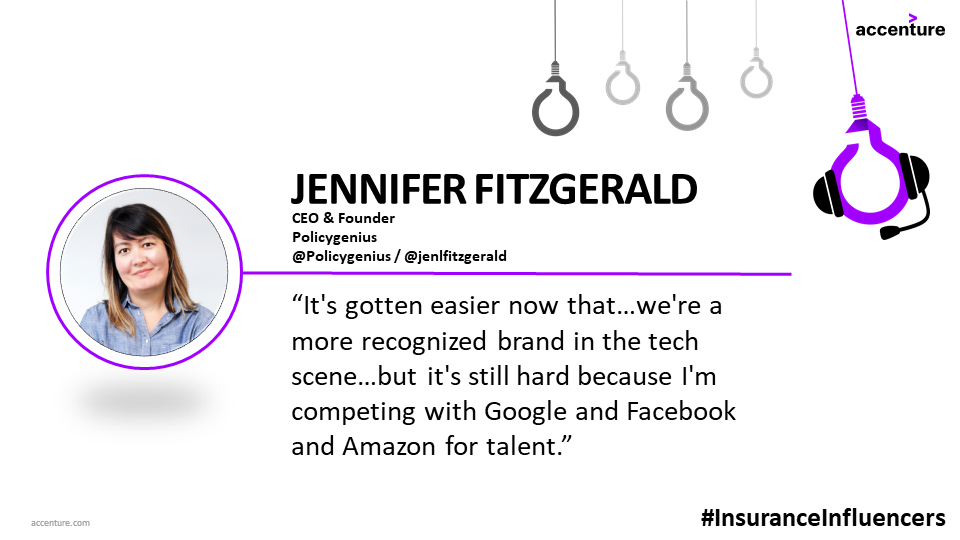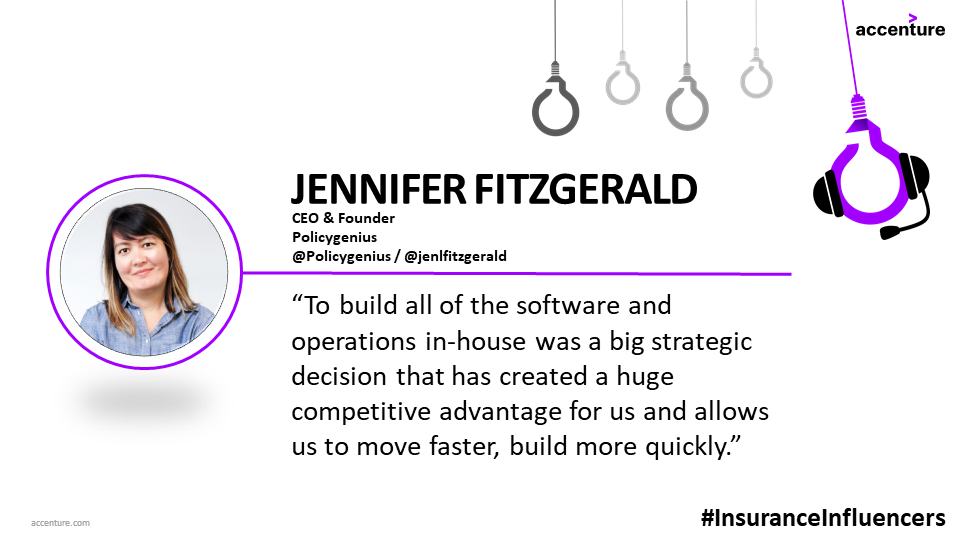Other parts of this series:
In this podcast episode, Jennifer Fitzgerald explains why talent has been critical to the company’s success, how it has operationalized its values—and the key decision points that have helped the start-up scale to include more than 200 people.
Highlights
- Talent has been critical to the success of Policygenius, and continues to be one of the company’s priorities. Jennifer Fitzgerald spends most of her time focused on recruiting and hiring—making sure the company has the right people in the right roles, and that they’re engaged, motivated and aligned with business goals.
- The company has developed clear values: the things it judges business decisions against, when there aren’t clear black-and-white answers. It has also operationalized those values—which contributes to its culture.
- Jennifer attributes the company’s success to timing, focus and content, as well as their decisions to build software and operations capabilities in-house.
Focus on insurtech
In season two of the Accenture Insurance Influencers podcast, we’ve gone behind the scenes in insurtech—and extracted lessons for what incumbents can learn, and what the industry needs to do to be competitive, agile and relevant.
How to scale culture, with Jennifer Fitzgerald
In this episode, we continue our conversation with Jennifer Fitzgerald, CEO at Policygenius. Jennifer explains how Policygenius has scaled from a team of five to more than 200 employees today. What decisions have been integral to their success—and what does she know today that she wishes she knew then?
The following transcript has been edited for length and clarity.
Hi, I’m Eagranie Yuh, and this is the Accenture Insurance Influencers podcast. In this episode, I’m speaking with Jennifer Fitzgerald.
Thanks for joining me today, Jennifer. I wanted to talk about your background. You’ve been in the Peace Corps, went to Columbia Law School and were a consultant at McKinsey, where you met your co-founder Francois de Lame. How do all these experiences come to play in what you’re doing today with Policygenius?
I mean, I think everybody’s got their own path to eventually starting a company. It was never something that was on the bucket list for me. I fell into the opportunity and had a lot of conviction about this idea, so that was my path.
I think what it affords me, as the CEO and co-founder, is a rich set of life experiences to draw from, which allows me to connect the dots pretty effectively. At this scale, as the CEO, we’ve built a really good leadership team. We’ve got several hundred people who work here now. I’m not fully, fully in the weeds and having to do all of the work anymore. My job is to be able to connect the dots and to bring both the insights and the wisdom to my team. It makes me sound like I’m very old. I’m not [laughter]. But the varied life experience has been helpful for that.
It also allows me to connect with a broader set of our customers. It allows me to think about how we frame ourselves to potential employees and it’s been helpful as we’ve grown this company.
I feel like that’s a challenging thing for an entrepreneur to do, especially if you have built a company up from the ground, from five people. In some cases, people have a leadership team and then don’t fully empower them. At what point did you realize, “Hey, I need to be stepping back. I need to install a leadership team”? And what was that like for you to hand over this company and say, “Hey, guys, here you go. I’m going to do these other things now?”
I didn’t really have to convince myself to do it because at some point, had I continued doing everything, I probably would have just dropped dead from exhaustion.
It was more just one, a matter of practicality. And then two, if you get it right, your job as a CEO is to hire people who are better than you in their respective functions, right? Who know technology, who know marketing, who know finance or org building.
What I found is that—and this is what I tell employees and the leadership team as well—every six months, especially in a growth-stage company, your job is changing. So I have to be conscious of the fact that my job evolves every few months and to make sure that I have the leverage, we have the team in place to support my new job and this new stage of company.
Handing over things was not the hard part for me. What’s the hard part—and it’s universally the hard part—is getting the right people in place. That’s incredibly hard to do.
So how do you find the right people?
You’ve got to focus, focus, focus on it. I spend most of my time each week in hiring. I’m either interviewing or I’m meeting potential candidates or sourcing folks or working with the leadership team and the people team to think about our hiring plans.
So most of the time I’m actually just thinking about recruiting and hiring. It’s one of the most important things that I can do. We’ve learned a lot over the years about how to interview effectively, how to think about the candidate experience. It’s been a lot of trial and error and there’s no shortcut.
I meet with a group of CEOs of similar-stage companies once a month and basically every issue that we talk about is some variation of, “I need to get my leadership team aligned,” or, “I’ve got gaps on my leadership team,” or, “I don’t know if I have the right leadership team.”
So at the end of the day, assuming that your idea’s validated and your strategy’s working—which is a big if, and a lot of companies die at that stage—once you get beyond that, it really just comes down to people. And making sure that you’ve got the right people in the right roles, and they’re engaged and they’re motivated and they’re all running in the same direction.
When you are hiring someone who’s better than you—and that implies that they know more than you—how do you objectively evaluate them? How do you know what you’re looking for if you don’t know as much as them?
You do a couple things.
One is—at least in the hiring phase—you’ve got folks who can speak to that. If I have to hire, for example, the head of technology, I will involve folks outside of the company who can also vet them. Back channeling is an important source of that. So not just the references that a candidate gives you, but I go deep and I dig and I talk to people who reported to you, worked alongside you, who were your boss. I’ll go a few companies back. You develop a complete picture of who that person is and how they’ve operated in different environments.
We have a pretty robust hiring process where there are people who will potentially report to the person, who will be peers to the person. And then, of course, the person who will manage that person are all part of it.
We try to do a pretty robust 360-degree view of that person as a candidate. I don’t need to know how to be a software engineer to make sure that I am hiring a good leader of software engineers, for example, if I’ve structured the recruiting and interview process correctly.
Right. It sounds to me like there’s a pretty deliberate focus, not just on the skillset that you’re looking for but also on the culture and the cultural fit of the person. Can you tell me about the culture at Policygenius and what you’ve tried to build?
Yeah. The culture has been very important to us. One of our earliest employees was a very seasoned head of people. And this sets us apart from other companies. Most companies don’t hire seasoned head of people until they’re 100-plus employees. She was our 23rd employee, I believe. So that just signals how important we thought it was to focus on culture.
Everybody says the job of a startup is to build the product, right, so build the machine. And at some point, you have to build the machine that builds the machine, which is around the people, the processes, the systems in place. We wanted to take a proactive approach to that early on.
We’ve thought a lot about culture. And culture basically boils down to your values, which are the behaviors and the traits that you want to encourage employees, that you want to reward. They are the things by which you judge business decisions that don’t have a clear black-and-white answer.
So we thought a lot about values and we thought a lot about how to operationalize values, which goes a long part to creating that culture.
I feel like values can be so helpful when they’re done well. And sometimes when they’re not, they become these hollow things that people throw around like, “Oh, we are open and transparent and ambitious.” But if they’re not backed up by systems or by leadership or other factors, they ring hollow. Can you talk about how you set the values, and how you back those up and actually bring them to life?
Sure. We’ve got our values. And any company can write their values on a piece of paper, to your point. And if you only do that, it’s pretty hollow and inauthentic. We’ve also thought very deliberately about how to operationalize those to make sure that they’re part of the DNA and they’re part of how we do business every day.
One of our values, for example, is no chuckleheads allowed. A lot of companies have a no jerks rule. I like the term chucklehead. It’s inclusive of jerks. So how do we operationalize that?
One big piece is we’ve got the values alignment interview. We typically have a couple of people in every single interview process who test for values alignment. We ask specific questions around that and we have turned down candidates who are otherwise very strong, great background, great resume, great skills but weren’t aligned with our values, or there was a concern they would be a chucklehead and be disruptive to the team. So that’s one way we operationalize that value.
One of our other values is you ought to know how to work the problem. So being an efficient, effective problem-solver is a behavior and a value that we prioritize at the company.
One way we operationalize that is I, for example, lead the entire company through problem-solving training every quarter. My co-founder and I developed a condensed version of the problem-solving training that you get as a brand-new McKinsey consultant, into a training module that we run the company through. And anybody can sign up for it and you can read up for it. So that’s one way we’ve operationalized that value and we’ve got a whole bunch of different examples to that. We totally agree with you that you got to put your money where your mouth is when it comes to values, or else it’s just hollow words on a piece of paper.
As you’ve scaled this company, as you’ve operationalized these values, what has been most surprising to you?
What’s been most surprising is, I think, the company takes on a life of its own beyond me. We have about 215 employees now. We can’t all fit in the same room. It used to be me and a handful of us working in a tiny room and everybody knew each other and everybody knew what was going on and there was that environment.
And now, across the 200 employees, there’s thousands and thousands of individual one-on-one relationships and it’s been fascinating and surprising for me to see the company take on a life of its own. That there are people who are friends outside of work, and there are inside jokes that I’m not a part of because the company is at a scale that I can’t know every inside joke now.
I think that’s been the most surprising thing is that things take on a life of their own and things start to move on their own without me having to kind of push that boulder, which is exactly what it was in the early days. So that’s been both surprising and super rewarding to see.
And the flip side of it, what have been some of your biggest challenges in scaling, and how have you addressed that challenge?
Yeah. I think our biggest challenge over the years is, again, going back to talent. That’s it. I think we’ve been very focused on strategy and building the right product. And sure, there have been a couple hiccups along the way but by and large our strategy, our vision, has not changed since day zero.
The hard things have been around people and how do you acquire really great talent when, especially in the early days, you don’t have a brand name. I think you take for granted when you’re at big companies, just how much of the heavy lifting the name on your business card does and there’s a machine that magically produces candidates for you to interview.
And when you are building a company from scratch, that is absolutely not the case. You’ve got to convince an employee or a prospective employee who has several—if not dozens of options—out there why your company (that they’ve never heard of before) is the place that they should invest at this next stage of their career. It’s gotten easier now that we’ve gotten bigger and we’re a more recognized brand in the tech scene in New York City but it’s still hard because I’m competing with Google and Facebook and Amazon, and you name the company, for talent. So that’s the evergreen hard thing about doing a business.
What are the distinctive things? Why would somebody choose to work at Policygenius versus Amazon or Google?
Impact. The big thing is, when you’re at those companies, you are one of tens of thousands, if not hundreds of thousands of employees. And at those companies, you can work really hard, but are you actually going to feel like the impact that you’re making is distinctive? I think most people, at some point, feel like, “I could not show up tomorrow, and nobody would notice.”
Whereas if you are at a company at our stage, it is very much felt, right? There’s not a lot of fat in the system. We run very lean. You’ve got the ability to make a decision today and implement it the same day versus, if you’re at a Google or an Amazon or a Facebook, there’s going to be levels and levels and layers and layers of bureaucracy and decision-making and stakeholder management that you have to go through. It’s a different thing, right? It’s also probably an easier lifestyle there versus here. Here there’s going to be more ambiguity; things change a lot more quickly.
It really depends on what stage you’re at and what you’re looking for out of your career. But if you don’t want to be the cog in the wheel at a big institution, this is a pretty compelling value prop for that person.
And what impact do you see Policygenius having on the industry or the world?
We are really transforming and changing the game in insurance. I think when we launched a few years ago, insurtech wasn’t a thing. There wasn’t an insurtech conference. We were one of the pioneers in insurtech, and we’ve created this wave of fast followers who are focused on life insurance, and insurtech more broadly. I think we’ve opened up the tech opportunity in insurance. And we are helping millions of customers every year, which is hugely important for me as the CEO and is very motivating for the employees here at Policygenius.
I’m curious because you have become this industry leader in insurtech, particularly in the life insurance space. What decision points do you think have been most influential to getting you to that point?
There are a few:
- Timing. I think you can always talk yourself away from the cliff of doing something high-risk. And so just doing it—and doing it when we did it—was a really great decision because so much of business is around timing. You can have a great idea, but if the timing’s off in the market, then it doesn’t matter. I think our timing was great to start the business when we did.
- Focus. I think some of the early-on decisions strategically made about what to focus versus what not to focus on –– so for example, not to go down the well-trodded path of auto insurance. Instead, to focus on life insurance when that started to take off.
- Building in-house capabilities. To build all of the software and operations in-house was a big strategic decision that not a lot of other companies have made, has created a huge competitive advantage for us now and allows us to move faster, build more quickly.
- Content. Early on, we saw an opportunity to focus on creating high-quality content that would not only provide great advice and decision support for users, but also allow us to open up Google organic search as a channel for us. It’s a long game, something that takes years to invest in before you start seeing results. But we did it, and we kept at it, and now it’s a huge moat between us and our competitors.
Before Policygenius, neither you nor your co-founder, Francois de Lame, had started a company before. What do you know now that you wish you knew then?
Everything [laughter]. Probably literally everything, which is why you see so many second- and third-time founders. We were just remarking about this the other day like, “Oh God, we’ve learned so much and there are so many things that if we were to do a second company at some point in the distant future, we would do these things differently.”
I think that’s why you see a lot of repeat founders. But at the same time, there’s just a lot of things that you can’t know until you experience it. Some of it is just around gut feeling. People can ask me, “When do you know that something is working or not?” and you can talk about leading indicators and lagging indicators and things like conversion and adoption. But sometimes, more often than not, it just feels like it’s working, everything’s clicking, every incremental thing gets incrementally easier. A lot of times, it’s just the gut feeling of everything coming together, or conversely, everything just grinding to a halt or feeling like it’s harder than it should be.
I don’t know that but for going through this, I could have told myself five, six years ago, “Hey, here are the things that that you should do,” other than, “Focus on getting the people right,” because that is a no-regrets move in any situation.
Where do you go for help if you’re stuck on something? You’ve mentioned that you have this network of founders of similar-sized companies. Do you have mentors, other groups, are you a book reader? Where are you going to get that insight that you need to make a decision more clear?
I am a book reader and newsletter reader and just generally just reading everything I can online about building, scaling a company. The most important thing, I think, is to have a network of peers who have also seen the movie that you’re in, or at least is a little bit further along just to bounce ideas off or for even just sanity check, how you’re approaching things.
Having a peer network is helpful. I don’t have a mentor per se. One panel I was on a couple of years ago, this woman who’s a founder and CEO of an HR tech company, she had a great metaphor, which I quite liked, which is that designating somebody a mentor is pretty stressful because that’s a lot on the shoulders of one person.
Instead, what you should have is kind of like your advisory board, right? Like you’ve got somebody that you go to for X. You’ve got somebody who you can bounce off for Y. And, for me, that’s just been a much more helpful construct. I’ve got a big network of people that I can ping. Whether it’s a super tactical question about, “Hey, how do I think about X thing?” versus somebody I can go out to dinner or grab a coffee with and have a more in-depth conversation. For me, that has been absolutely key.
I noticed that you are a storyteller. You told a story on The Moth and you used to do stand-up comedy. Do you feel like that brings another lens to the insurance story, and particularly the content side of things?
Oh, totally. And the storytelling and the creative side has been important for our early days of marketing content strategy. But even more tactically as a CEO, a lot of what I have to do on a regular basis is frame a compelling story for people—whether it’s perspective candidates, whether it’s investors, whether it’s getting everybody excited at all-hands meetings about this new product that we’re launching. So much of what I have to do is being effective storyteller to whatever audience I’m speaking to. So that’s been a really, really useful skill for me.
Well, I’ve really enjoyed hearing some stories today, and I hope some of them resonate with our listeners. Thanks for making the time to speak with me today.
Summary
- In hiring, Policygenius develops a 360-degree review of potential candidates, including extensive vetting across previous companies including direct reports, co-workers and managers.
- Early on, Policygenius saw an opportunity to capture Google organic search as a channel. The investment in high-quality content has resulted in a significant moat between the company and its competitors.
- Now that Policygenius has established itself as a leading insurtech and player in the New York tech scene, recruiting and hiring talent is easier. However, the company is still competing against other tech companies for talent—in other words, talent is the evergreen hard thing about doing business.
For more guidance on scaling culture:
- Read why the right leadership, environment and culture is crucial for building trust within an organization.
- Revisit the top takeaways from season one of the Talking Agility podcast.
- Learn why it’s so important to reimagine HR for financial services.
And that’s a wrap on season two of the Accenture Insurance Influencers podcast. Many thanks to all of our guests for making the time to share their stories: Scott Walchek from Trov, Caribou Honig from InsureTech Connect, Ruth Foxe Blader from Anthemis, Shefi and Avi Ben-Hutta from Coverager and last but not least, Jennifer Fitzgerald from Policygenius. Thanks also to our listeners and readers—we couldn’t do it without you.
We’re already at work on season three of the podcast, with episodes queued up for the new year. Subscribe to get those updates as soon as they’re released. In the meantime, you can catch up with previous podcast episodes here.
What to do next:
Visit com/insuranceinfluencers for more information or subscribe directly here:
Contact us if you’d like to be a guest on the Insurance Influencers podcast.
















